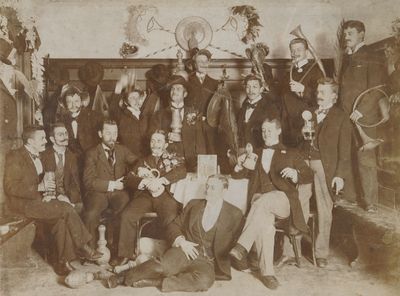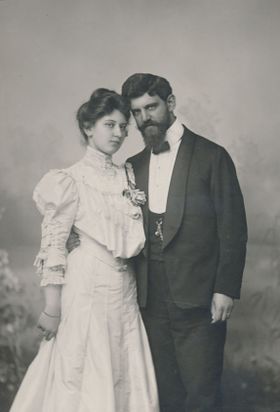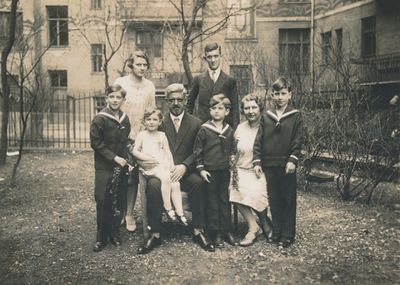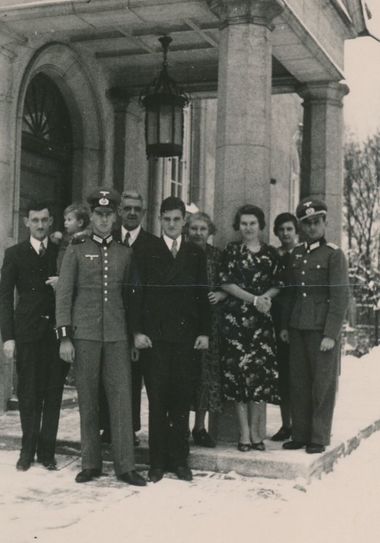Otto Eckart (Da VIII 23)
Otto Friedrich Richard Eckart, (Da VIII 23), (*March 8, 1877, in Munich, Germany, †December 13, 1942, in Munich, Germany), canning factory owner, qualified agronomist, königlich bayer. Kommerzienrat (an honorary title bestowed by the King of Bavaria upon distinguished businessmen), captain, genealogist; married Anita Doris Wilhelmine Hoppe on October 11, 1906, in Munich, Germany.
Childhood at the Square Gärtnerplatz
Back in Munich
Studies in Munich and Rostock
In 1896, at the age of 19 years, Otto started studying agriculture at the Technical University of Munich. In 1898, he spent one term at the Royal Academy for Agriculture and Brewery in Weihenstephan. Back at the Technical University of Munich, he graduated in 1900 with a diploma. Following this, he studied chemistry for three semesters at the University of Rostock. Since his time as a student, Otto was a member of the fraternity Academic Chemists’ Association and of the Munich Rowing Club in Starnberg; he was also active in the Kaufmanns-Casino (Businessmen’s Casino) and its youth organization "Fidelitas". It was in the Businessmen’s Casino where he became acquainted with his future wife, Anita Hoppe. During this time, he also started to work in his father’s canning factory. From April 1901 to March 1902, Otto Eckart completed his military service as "one-year volunteer" at the first sea battalion of the naval infantry in Kiel.[1]
The will of his father Johannes Eckart originally made provisions for Otto to only enter the family company at the age of 30 years. However, his future father-in-law, a Munich bank director, wanted to ensure the financial security of his daughter Anita prior to the wedding. Otto officially joined the company "Johs. Eckart" in 1906. On October 11 of that year, Anita and Otto got married in Nuremberg. Hedwig Eckart, Otto’s sister, described the couple’s relationship as very harmonious. In their apartment at the address Auenstr. 113, they regularly hosted social evenings at which music was played and discussions took place. Their first daughter, Ruth Eckart, was born in January 1908, their second child, Werner Eckart, in March 1909. In 1910, the family moved from the city to the countryside, to Poing. Otto and Anita had found an old schoolhouse and bought it for the price of 7,120 Mark. Following extensive renovation, the old schoolhouse was turned into a magnificent villa. At Pentecost 1911, they had a jolly housewarming party with 30 guests. In nearby Grub, the canning factory had leased numerous fields and set up an office where Otto was now able to work. The couple had bought a car, a "Sperber" with 17 hp, for commuting between Grub and Poing. On Sundays, Otto, a passionate hunter, regularly participated in hunting parties in Poing. When Ruth Eckart reached compulsory school age in 1914, the family also rented an apartment in Munich, at the address Grillparzerstr. 43, as the children – the third child Lisbeth Eckart had been born in 1911 – were supposed to go to school in Munich.[2]
The Years in Kiel
World War I started in 1914. On August 3, Otto Eckart was drafted into military service in Kiel, but already deferred from military service six days later, as he was considered "indispensable". He returned to Munich and immediately took over the management of the factory in Zamdorf. The Eckarts’ canning factory supplied the army with food, mainly canned meat, and dried potatoes. The company also supplied the Ottoman Empire, an ally of the German Empire. In the spring of 1914, Otto traveled to Istanbul on business in order to conduct negotiations with the Turkish Ministry of War. He was drafted again in October 1914, this time to the XII. battalion of the Seewehr (sea defense). In November, he was admitted to a hospital in Kiel due to severe appendicitis. After a severe course of illness and surgery, he was discharged from hospital on December 22 and spent the Christmas holidays with his family in Poing. After a short time in Munich as instructor at the 1st infantry regiment, Otto returned to Kiel in 1915. His family followed at the end of that year. They lived in cramped conditions for a short time, until they were able to move into a spacious apartment in the street Norddeutsche Strasse in 1916. Otto also bought a farmer’s cottage in Raisdorf, near Kiel, to ensure the family had enough food which was scarce in times of war. In 1916 – the family had moved again and now lived in a villa on the street Bartelsallee in Kiel – a tragic accident happened. During a walk, the horse ridden by Otto shied. This caused a confusion in which the five-year-old Lisbeth Eckart, who had accompanied her father, was hit by a passing streetcar, and so seriously injured that she died shortly afterwards. Anita Eckart had stayed at home; she was heavily pregnant at that time and less than one month later, on November 14, 1916, Klaus Eckart was born.[3]
In the summer of 1918, the war was clearly drawing to a close. Anita was pregnant again and Otto had been appointed "Königlich Bayerischer Kommerzienrat" (an honorary title bestowed by the King of Bavaria upon distinguished businessmen) on August 5.[4] The November Revolution, which eventually ended World War I and also the German Empire, started in Kiel. The Eckart family witnessed the historic events first-hand.
Back in Munich
From revolutionary Kiel, the family of Otto and Anita Eckart soon moved back to Bavaria, which before long was to undergo revolution as well. On December 6, Fritz Eckart, Otto and Anita’s third son, was born in Munich. In 1919, the family lived at the address Grillparzerstrasse 43 again and continued to spend a lot of time in Poing. The former schoolhouse was further modified, and the estate was extended with the purchase of several neighboring plots of land. The family and also the company "Johs. Eckart" survived the currency crisis and the hyperinflation that followed the war. The family’s sixth child, Horst Eckart, was born in April 1921, the seventh, Ingeburg Eckart, in July 1923. Otto was appointed to the supervisory board of the company Donau-Ost AG in 1923 and spent some time away on business in Turkey, Palestine, and Egypt. In the family business "Johs. Eckart", though, there was growing tension between Otto and his nephew Hanns Eckart. Eventually, Otto left the company in 1926 and took over a bankrupt canning factory in Ettmansdorf, near Schwandorf. With the help of Anita and his eldest son Werner, he tried to put the company back on a successful track. Werner had to quit school to do so but received his father’s stamp collection as compensation.
1928 trat Otto in den „Stahlhelm, Bund der Frontsoldaten“ ein, der bewaffnete Arm der demokratiefeindlichen Deutschnationalen Volkspartei (DNVP). 1930 wurden Otto und Anita zum ersten Mal Großeltern. Ihre erstgeborene Tochter Ruth Eckart hatte 1929 den Betriebs- und Volkswirt Fritz Reuter geheiratet. Am 28. August 1930 kam ihr erster Sohn Johannes Reuter in Berlin zur Welt.
Für zwei Jahre wohnte die Familie Otto Eckart zwischen 1931 und 1933 in der Prinzregentenstr. 7 in München. Trotz der prunkhaften Wohnung im Herzen Münchens war es für die Familie Otto Eckart wirtschaftlich eine schwierige Zeit. Die Weltwirtschaftskrise hatte die neue Firma schwer mitgenommen, so dass sie 1932 erneut Konkurs anmelden mussten. Das Anwesen in Poing wurde vermietet, die zugehörige Landwirtschaft und die Tiere wurden verkauft oder verpachtet. Otto nutzte seinen guten Ruf als Geschäftsmann, um durch Hypotheken und Kredite genug Kapital für eine neue Firmengründung zu bekommen: Am 1. Juli 1932 wurde die Firma Otto Eckart in München gegründet. Die Geschäftsfelder waren neben Fruchtsaftherstellung, Konservenfabrikation auch ein Lebensmittelgroßhandel. Ottos Verbindungen zum Stahlhelm halfen ihm, erste Kunden zu werben, und er begann die Großküchen der Stahlhelm-Arbeitsdienstlager zu beliefern.[5]
Otto Eckart im Nationalsozialismus
Im Januar 1933 übernahmen die Nationalsozialisten die Macht. Otto und Anita waren in Berlin und konnten den Fackelumzug der Faschisten durch das Brandenburger Tor mitverfolgen. In München besetzten die Nationalsozialisten im März das Rathaus und proklamierten ihre Machtübernahme. Noch im gleichen Jahr begann die systematische Verfolgung von Juden und politischen Gegnern. Aus dem Bekanntenkreis des Otto Eckart wurde der erfolgreiche jüdische Unternehmer Max Uhlfelder verhaftet. Nach seiner Freilassung kam er heimlich einige Tage bei der Familie Eckart unter, bevor er weiterzog und schließlich über die Schweiz in die USA emigrieren konnte.
Der neue, nationalsozialistische Reichsstatthalter Franz Ritter von Epp wählte die Wohnung der Eckarts in der Prinzregentenstr. 7 als seinen neuen Dienstsitz. Die Familie musste ausziehen und zog im Juni 1934 in eine sehr geräumige Villa in der Pienzenauerstraße 41. Anita ging es zu dieser Zeit gesundheitlich immer schlechter. Sie wurde im Juli 1934 operiert, litt aber noch für einige Zeit an den Folgen der Krankheit. In dem Haus der Eckarts wohnten seit ihrer Hochzeit 1935 auch Werner Eckart mit seiner Frau, der Kindergärtnerin Anny Böhm. Anny unterstützte ihre kranke Schwiegermutter im Haushalt und half auch in der Firma Otto Eckart mit. Das Familienunternehmen wurde in der Folge von Otto, Anita, Werner und Anny geführt.
Anita Eckart starb am 21. Juni 1939 im Alter von 52 Jahren, noch vor dem Beginn des Zweiten Weltkrieges. Otto Eckart überließ in der folgenden Zeit das Geschäft des Familienbetriebs immer mehr seinem erstgeborenen Sohn Werner und seiner Schwiegertochter Anny Eckart. Neben ihrer Rolle in der Firma Otto Eckart führte Anny nun den Haushalt in der Pienzenauerstr. und pflegte ihren bald schwer kranken Schwiegervater Otto. Bis auf Werner, der aufgrund seiner Tätigkeit in der Firma „unabkömmlich“ war, wurden alle Söhne von Otto in die Wehrmacht eingezogen. Bevor Otto am 13. Dezember 1942 im Alter von 65 Jahren in München starb, musste er noch miterleben, wie seine Söhne Klaus und Fritz Eckart in einem Krieg ums Leben kamen, den er als Mitglied im Stahlhelm und seine Firma als wichtiger Lieferant der Wehrmacht half vorzubereiten.[6]
Familie
Aus der Ehe mit Anita Hoppe gingen sieben Kinder hervor.
- Ruth Eckart (Da IX 32), (*15.01.1908 München, †19.04.1960 München).
- Werner Johannes Adolf Eckart (Da IX 33), (*27.03.1909 München, †15.05.1997 München), Konservenfabrikant, Gründer von Pfanni, Konsul von Guatemala und Philippinen, Handelsrichter, Familienforscher.
- Lisbeth Eckart (Da IX 34), (*14.10.1911 München, †06.10.1916 Kiel).
- Klaus Karl Eduard Paul Eckart (Da IX 35), (*14.11.1916 Kiel. †03.06.1940 Forbach, Frankreich), Oberleutnant.
- Fritz Ruprecht Eckart (Da IX 36), (*06.12.1918 München, †03.10.1942 Beverwjik, Niederlande), Leutnant.
- Horst Eckart (Da IX 37), (*08.04.1921 München, †26.06.1944 Orscha, Sowjetunion), Leutnant.
- Ingeburg Eckart (Da IX 38), (*23.07.1923 München, †27.10.2020 München), Musik-Professorin, Oberstudienrätin.
Einzelnachweise
- ↑ Eckart, Otto and Kamp, Michael: "Die Geschichte der Familie Eckart. Von Franken nach München und Hawaii" (The History of the Eckart Family. From Franconia to Munich and Hawaii), Munich 2015, pages 209–212.
- ↑ Eckart, Otto and Kamp, Michael: "Die Geschichte der Familie Eckart. Von Franken nach München und Hawaii" (The History of the Eckart Family. From Franconia to Munich and Hawaii), Munich 2015, pages 217–226.
- ↑ Eckart, Otto and Kamp, Michael: "Die Geschichte der Familie Eckart. Von Franken nach München und Hawaii" (The History of the Eckart Family. From Franconia to Munich and Hawaii), Munich 2015, pages 229–237.
- ↑ Eckart, Otto and Kamp, Michael: "Die Geschichte der Familie Eckart. Von Franken nach München und Hawaii" (The History of the Eckart Family. From Franconia to Munich and Hawaii), Munich 2015, pages 244f.
- ↑ Eckart, Otto und Kamp, Michael: Die Geschichte der Familie Eckart. Von Franken nach München und Hawaii, München 2015, S. 259 ff.
- ↑ Eckart, Otto und Kamp, Michael: Die Geschichte der Familie Eckart. Von Franken nach München und Hawaii, München 2015, S. 281 ff.



